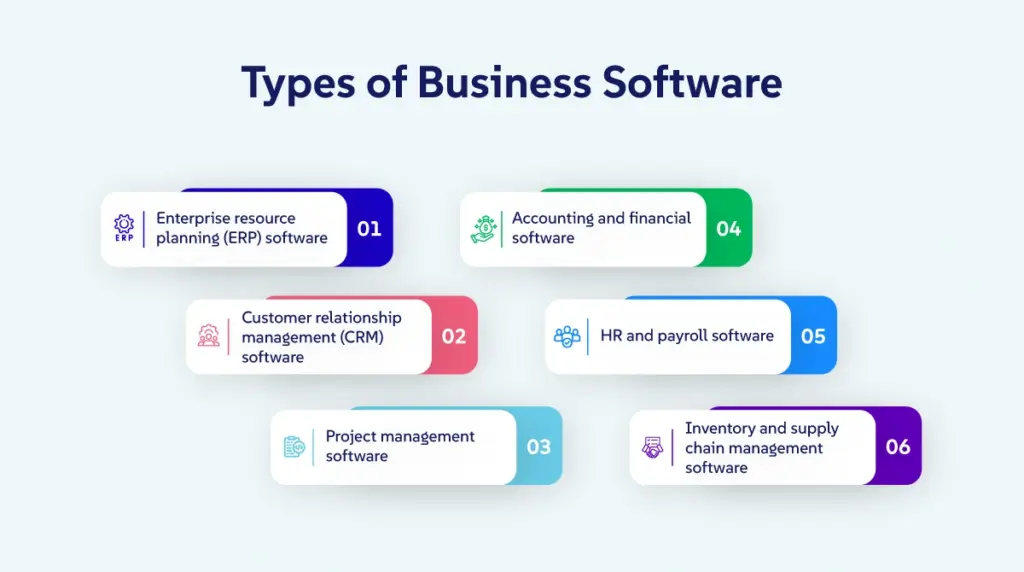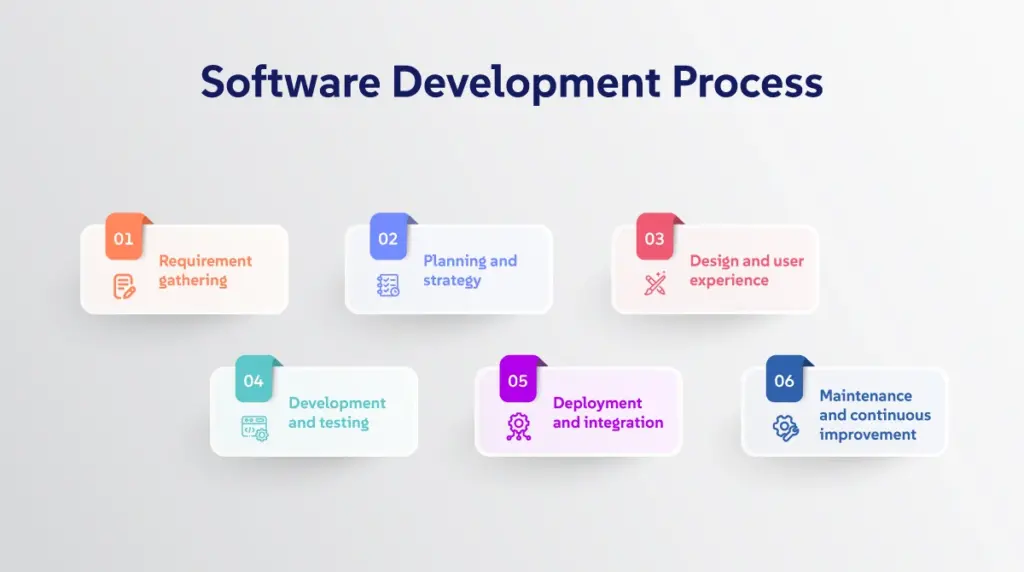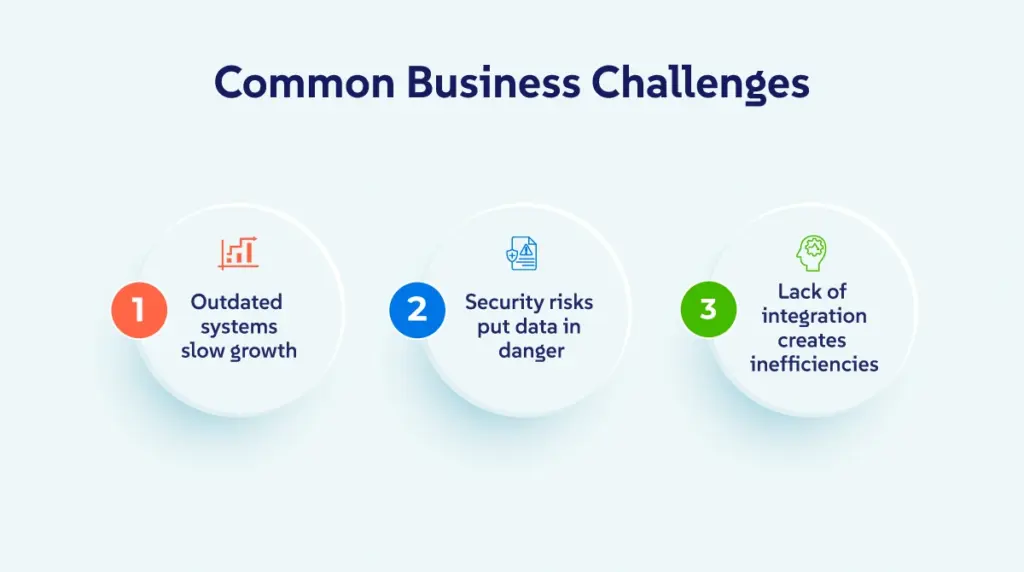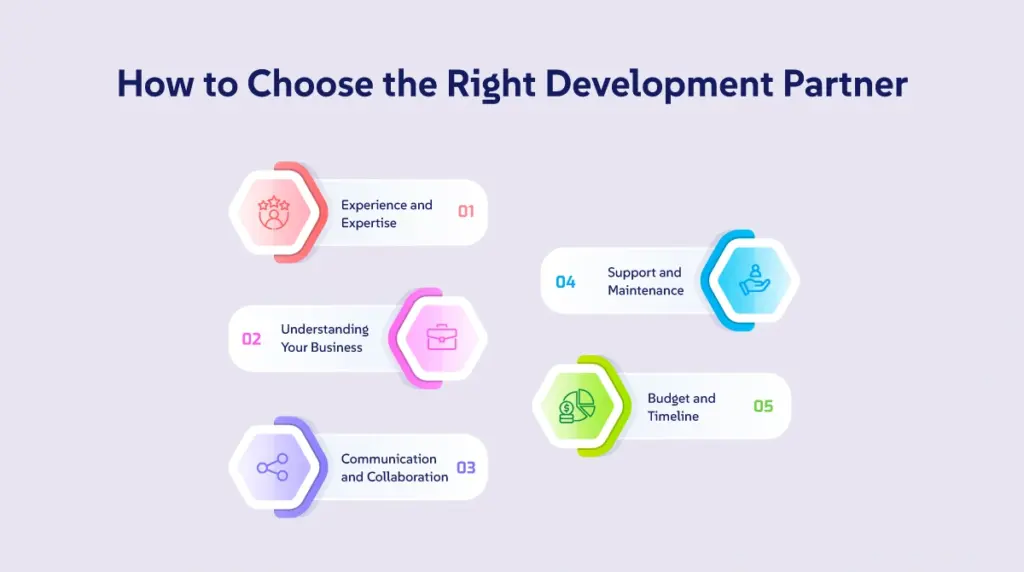Is your business software development strategy helping you grow or holding you back?
Did you know that using the right tools can boost productivity and cut down on wasted time? On the flip side, outdated or poorly matched software can hold your team back and slow your progress.
That’s where custom solutions come in. They streamline everyday tasks, strengthen security, and help teams work more efficiently. With a system built around your needs, your business can grow faster and stay one step ahead of the competition.
So, today, we’ll discuss what is business software development, some common challenges businesses face, and how the right software can solve them.
What is Business Software Development?
Business software development is the process of creating custom software to meet a company’s specific needs. It helps businesses automate tasks, manage data, and improve efficiency.
Unlike generic software, custom solutions are built to fit unique workflows and goals.
For example, a retail business may need software to track inventory in real time. A ready-made solution might not offer the right features.
But with business application development, they can get a system that updates stock levels, sends alerts, and integrates with sales data. It will save time and reduce errors.
Types of Business Software

Businesses need different software to manage daily operations efficiently. From handling customers to tracking finances, the right tools make everything smoother.
Business application development creates solutions tailored to specific needs, helping companies stay productive and competitive.
Now, let’s explore the types of business software.
1. Enterprise Resource Planning (ERP) Software
ERP systems bring all business processes into one platform. They help manage inventory, finances, HR, and supply chains. With business software development, companies can get ERP solutions that fit their unique workflows.
For example, Oracle ERP Cloud is a comprehensive, cloud-based enterprise resource planning solution designed for medium to large businesses. It offers integrated modules for finance, procurement, project management, risk management, and compliance.
With real-time analytics, automation, and scalability, Oracle ERP Cloud helps organizations streamline operations, improve decision-making, and drive business growth.
2. Customer Relationship Management (CRM) Software
A CRM helps businesses track leads, manage customer interactions, and improve sales.
A business application developer can build a CRM that automates follow-ups, integrates with marketing tools, and boosts customer engagement.
Let’s see an example of a CRM software:
Salesforce CRM is a leading cloud-based customer relationship management platform. It helps businesses manage sales, marketing, customer service, and more.
The platform offers powerful tools for lead tracking, opportunity management, workflow automation, and customer engagement. It also offers AI-powered insights (via Salesforce Einstein) and extensive customization options.
Salesforce helps businesses improve customer relationships, boost productivity, and drive revenue growth.
3. Project Management Software
Keeping projects on track is crucial. Project management tools help assign tasks, set deadlines, and monitor progress.
Custom business application development ensures teams collaborate efficiently with tailored features.
Example: ClickUp is an all-in-one project management platform designed to help teams plan, organize, and track work in one place.
It offers customizable views like lists, boards, calendars, and Gantt charts, along with features like task management, time tracking, goal setting, docs, and real-time collaboration.
4. Accounting and Financial Software
Managing money is easier with the right software. These tools track expenses, process invoices, and generate financial reports. Developing business software for accounting ensures accuracy, compliance, and smooth transactions.
Example: Xero is a cloud-based accounting software designed for small businesses and accountants. It offers easy-to-use tools for invoicing, bank reconciliation, expense tracking, inventory, and financial reporting.
Xero helps businesses manage their finances more efficiently and stay on top of cash flow.
5. HR and Payroll Software
HR tools simplify hiring, employee records, and payroll processing. A business software solution can automate tax calculations, leave tracking, and performance management, reducing manual work.
Example: BambooHR is a HR software designed for small to midsize businesses to streamline and simplify human resource management.
It offers tools for employee data management, onboarding, time-off tracking, performance reviews, and applicant tracking. BambooHR helps HR teams save time, improve employee experience, and make data-driven decisions.
6. Inventory and Supply Chain Management Software
Tracking stock levels and managing suppliers is critical for businesses. Custom business software development helps streamline inventory control, prevent shortages, and improve order management.
Example: Zoho Inventory is designed for small to medium businesses. It helps manage stock, track orders, and streamline warehouse operations with features like order fulfillment, shipping integrations, and multi-channel sales management.
Zoho Inventory integrates seamlessly with other Zoho apps and popular eCommerce platforms. lt helps businesses to optimize their supply chain and improve inventory accuracy.
Business Software Development Process: Step-by-Step

Building custom software involves several steps to create solutions that fit a business’s unique needs. Each phase is carefully crafted to ensure the software is efficient, scalable, and effective in solving real business problems.
1. Requirement Gathering
The process begins by understanding the specific needs of the business. The development team works with key stakeholders to identify challenges and set goals for the software. This step forms the foundation for creating a tailored solution.
2. Planning and Strategy
Once requirements are clear, the team devises a detailed plan. They outline features, set milestones, and ensure the strategy aligns with the business’s long-term goals. Proper planning is essential for creating scalable and future-proof software.
3. Design and User Experience
Design focuses on the user interface and overall experience. A seamless, intuitive design ensures that users can navigate the software effortlessly. Tailored design enhances usability and ensures the solution meets user expectations.
4. Development and Testing
During this stage, the software is built, and functionality is implemented. The development team writes the code, integrates features, and tests the software for bugs. Comprehensive testing ensures that the product is secure and performs as expected.
5. Deployment and Integration
After thorough testing, the software is deployed into the business environment. The development team ensures smooth integration with existing systems, enabling seamless transitions and minimizing disruption to operations.
6. Maintenance and Continuous Improvement
Once the software is live, ongoing maintenance is essential. Regular updates, bug fixes, and feature enhancements ensure the software remains relevant, secure, and aligned with evolving business needs.
The software development process ensures that custom solutions are created efficiently.
Common Challenges a Business Faces While Developing a Software

Every business faces challenges that slow down growth and efficiency. Outdated software, security risks, and poor system integration are common issues. Without the right tools, businesses struggle to manage operations smoothly.
Now, let’s discuss some key challenges companies face and how business application development can solve them.
1. Outdated Systems
Many companies still rely on old software that can’t keep up with modern demands. These systems struggle with large data, slow down operations, and fail to integrate with new tools.
So, you must create custom solutions that will improve efficiency and scalability of your business.
2. Security Risks
Weak security leaves businesses exposed to cyber threats and data breaches. Generic software often lacks strong protection.
Developing business software with advanced security features helps safeguard sensitive information and ensures compliance with industry standards.
3. Lack of Integration
Businesses use multiple applications for different tasks, but if they don’t work together, it leads to errors and wasted time. Business application development focuses on seamless integration, allowing all systems to communicate and work efficiently.
With the right business software solutions, companies can overcome these challenges and optimize their operations.
How to Choose the Right Software Development Partner?

Choosing the right development partner is crucial for building custom software that meets your business needs. The right team will understand your goals, provide expertise, and guide you through the development process from start to finish.
So, what to look at when you are choosing the right development partner?
1. Experience and Expertise
Look for a team with a proven track record in developing business solutions. A reliable partner will have experience in creating software tailored to your industry.
They should understand the latest technologies and trends to deliver cutting-edge solutions.
2. Understanding Your Business
A great development partner takes the time to understand your business, its challenges, and goals.
This ensures the software is built around your unique needs, creating a solution that drives growth and improves efficiency.
3. Communication and Collaboration
Clear and continuous communication is key. The right team should be easy to reach and responsive to your feedback.
Collaboration throughout the development process helps ensure that the final product aligns with your vision.
4. Support and Maintenance
After the software is deployed, ongoing support is vital. Choose a partner that provides continuous maintenance and is ready to make updates and improvements as needed. This ensures your software stays relevant and secure.
5. Budget and Timeline
Set realistic expectations for both budget and timeline. A trusted partner will offer transparent pricing and provide a clear schedule, ensuring that the project is completed on time and within budget.
If you’re ready to build custom software that helps your business thrive, Boomdevs is here to help. Our team of experienced developers will work with you every step of the way to create tailored solutions that align with your goals.
How Boomdevs Can Help You?
At Boomdevs, we specialize in custom software development tailored to your unique business needs. With years of experience in business application development, we understand the importance of building solutions that truly fit your business.
Our team works closely with you to understand your goals and challenges. We guide you through every step of the process, from planning to deployment, ensuring everything is handled with expertise.
Whether you need a custom CRM, ERP system, or any other business software, Boomdevs delivers efficient, scalable, and secure solutions.
Frequently Asked Questions:
Q1. What are the benefits of custom business software development?
Custom software enhances efficiency, automates processes, and integrates seamlessly with existing systems. It’s scalable, secure, and tailored to fit specific business needs, ensuring long-term growth.
Q2. How does business software improve workflow automation?
It reduces manual tasks by automating repetitive processes like data entry, invoicing, and reporting. This boosts productivity, minimizes errors, and allows employees to focus on high-value tasks.
Q3. What factors affect the cost of business application development?
The cost depends on project complexity, required features, development time, and integration needs. Customization, security requirements, and ongoing maintenance also influence pricing.
Q4. How long does it take to develop a business application?
The timeline varies based on software complexity, features, and development approach. Simple applications may take a few months, while enterprise-level solutions can take six months or more.
Q5. What security measures should be included in business software?
Strong encryption, multi-factor authentication, regular security updates, and compliance with industry standards protect sensitive data and prevent cyber threats.
Q6. Can custom business software integrate with existing tools?
Yes, custom software can be designed to integrate with CRM, ERP, accounting, and other business tools, ensuring smooth data flow and process efficiency.
Q7. How do you choose the right technology stack for business software?
The right tech stack depends on scalability, security, performance needs, and integration requirements. Consulting with experts ensures the best choice for long-term success.
Final Words
Business software development is essential for companies looking to improve efficiency, automate tasks, and stay competitive. A well-built solution streamlines operations, enhances security, and scales with business growth.
Choosing the right development partner ensures a smooth process from planning to deployment. Invest in custom software today to drive innovation and long-term success.



Leave a comment